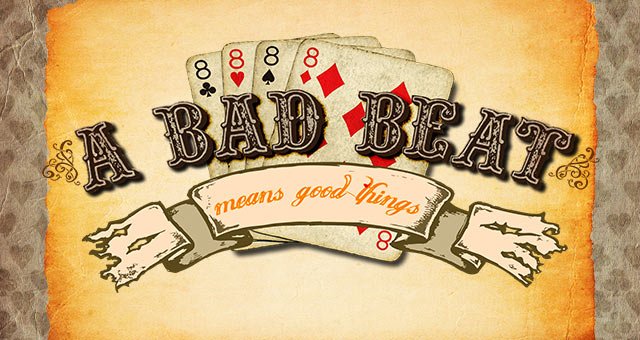

- Potawatomi Poker Bad Beat heavier on the side of slots titles, in which case you will find these real money sites to Potawatomi Poker Bad Beat your liking: For many players, it is just nice to be able to Potawatomi Poker Bad Beat find all the games they could possibly want in one location, saving the time needed to create new accounts all over.
- Potawatomi State Park on the shore of Sturgeon Bay in southern Door County, has 1,200 acres of gently rolling upland terrain bordered by steep slopes and rugged limestone cliffs. The park is named in honor of the tribe that inhabited Green Bay’s shores and islands when Europeans first settled the area.
NEW BUFFALO, Mich. – July 10, 2019 – The Pokagon Band of Potawatomi Indians’ Four Winds® Casinos are pleased to announce a recent Bad Beat jackpot totaling $166,026.20 was split between 8 players at the Four Winds South Bend poker room. One lucky guest from Benton Harbor, Michigan took 50% of the payout, winning $83,013.10. The casino has a wide range of restaurants (Asian, steakhouse, Italian, food court, etc.) but no regular table side food service. Drink service is really slow in the room. Players in the room are better than average, but still plenty of loose money to make it worth your time. Bad beat and mini bad beat jackpots tend to be very large. Poker room was good also. Different games and limits, good dealers and floor. Dropping the 2-4 limit and going to 3-6. Would be nice for the bad beat jackpot to hit, everyone gets a share in holdem. My spouse plays slots, didn't win but just lost a little bit over the time spent. Will return for sure.
Универсальный англо-русский словарь. Академик.ру. 2011.
Смотреть что такое 'bad beat' в других словарях:
Bad beat — This article is about the poker term. For the poker player, see Neil Bad Beat Channing. In poker, bad beat is a subjective term for a hand in which a player who had what appeared to be strong cards nevertheless loses. It most often occurs where… … Wikipedia
Bad Beat — Eine Hand trotz vier Assen zu verlieren, sollte als Bad Beat bezeichnet werden Ein bad beat beschreibt in den Hold em Varianten des Kartenspiels Poker eine Hand, die trotz ihrer offensichtlichen Stärke verliert. Unter den Pokerspielern gibt es… … Deutsch Wikipedia
Bad beat — Définition L expression «bad beat» est tirée du vocabulaire anglophone du poker. Elle désigne une situation fréquente où un joueur est en possession d une main de poker forte, face à un joueur possédant une main de valeur inférieure, voire faible … Wikipédia en Français
bad beat — noun The losing of a hand after being the mathematical favorite to win at the start of the hand … Wiktionary
Bad Beats — Eine Hand trotz vier Assen zu verlieren, sollte als Bad Beat bezeichnet werden Ein bad beat beschreibt in den Hold em Varianten des Kartenspiels Poker eine Hand, die trotz ihrer offensichtlichen Stärke verliert. Unter den Pokerspielern gibt es… … Deutsch Wikipedia
Beat it — Single par Michael Jackson extrait de l’album Thriller Face B Burn this Disco Out Sortie Février 1983 … Wikipédia en Français
Bad Reputation — Album par The Ritchie Family Sortie 1979 Albums de The Ritchie Family … Wikipédia en Français
Beat It — Single par Michael Jackson extrait de l’album Thriller Face B Burn This Disco Out (R U) / Get on the Floor Sortie Février 1983 Enregistrement 1982 … Wikipédia en Français
Bad Dudes Vs. DragonNinja — Bad Dudes North American arcade flyer of Bad Dudes Vs. DragonNinja. Developer(s) Data East … Wikipedia
Beat It — «Beat It» Сингл … Википедия
Beat It — Michael Jackson Veröffentlichung 26. Februar 1983 Länge 4:17 Genre(s) Pop Autor(en) Michael Jackson … Deutsch Wikipedia
Книги
- Beat the Forex Dealer. An Insider's Look into Trading Today's Foreign Exchange Market, Agustin Silvani. The foreign-exchange market is often referred to as the Slaughterhouse where novice traders go to get'chopped up'. It is one of egos and money, where millions of dollars are won and lost… ПодробнееКупить за 5073.08 рубэлектронная книга
- TrimTabs Investing. Using Liquidity Theory to Beat the Stock Market, Charles Biderman. Whether you are an investment professional managing billions of dollars or an individual investor with a small nest egg, TrimTabs Investing shows you how to beat the major stock market… ПодробнееКупить за 2883.85 рубэлектронная книга
- The Little Book of Trading. Trend Following Strategy for Big Winnings, Michael Covel W.. How to get past the crisis and make the market work for you again The last decade has left people terrified of even the safest investment opportunities. This fear is not helping would-be… ПодробнееКупить за 1622.74 рубэлектронная книга
Potawatomi Poker Bad Beat
The Potawatomi are an Algonkian-speaking tribe which has lived in the Great Lakes region for at least four centuries.
Potawatomi Bad Beat Jackpot
Oral traditions of the Potawatomi, Ojibwe, and Ottawa assert that at one time all three tribes were one people who lived at the Straits of Mackinac. From there, they split off into three separate groups, and the Potawatomi were 'Keepers of the Sacred Fire.' As such, they were the leading tribe of the alliance the three Indian nations formed after separating from one another. Linguistic, archaeological, and historical evidence suggests that the Potawatomi, Ojibwe, and Ottawa did indeed descend from a common ethnic origin. The three languages are almost identical. In their own language, the word Potawatomi means 'Keepers of the Sacred Fire,' but they call themselves Neshnabek, which means 'the True People.'

When Jean Nicolet arrived at Green Bay in 1634, he met a few Potawatomi there. At this time, the Potawatomi lived in Michigan, and any Potawatomi at Green Bay were most probably visiting. This situation changed dramatically in the 1640s and 1650s when the League of the Iroquois in upstate New York began to raid Indian tribes throughout the Great Lakes region to monopolize the regional fur trade. Like other tribes in the southern peninsula of Michigan, the Potawatomi were forced westward by the Iroquois onslaught. By 1665, the tribe relocated on the Door County Peninsula in Wisconsin. When the Iroquois threat receded after 1700, the Potawatomi moved south along the western shore of Lake Michigan. They also moved back into Michigan, which they had occupied before the Iroquois wars. By 1800, their tribal estate included northern Illinois, southeastern Wisconsin, northern Indiana, southern Michigan, and northwestern Ohio.
Wars Involving Europeans
Like other tribes in the Great Lakes region, the Potawatomi became trading partners and military allies of the French. When the Fox Indians rose up in Wisconsin against the French between 1712 and 1735, the Potawatomi and other tribes participated in many battles on the side of the French. Beginning in 1731 and continuing into the 1740s, many Potawatomi warriors aided the French in putting down the recalcitrant Chickasaw. Some war parties went as far south as present-day Tennessee. Between 1752 and 1756, the Potawatomi again aided the French, this time against the Illinois tribe, who were driven out of northern Illinois.

The Potawatomi remained loyal to France during the century of warfare against Great Britain. Between 1689 and 1763, the French and British fought a series of four wars for control over North America. The Potawatomi fought in the third war, King George's War, in 1746-47. They went to Montreal, and from there they attacked the British colonies as far east as New York and New England. The most important of the colonial wars was the French and Indian War or Seven Years' war from 1754 to 1763. The Potawatomi continued to ally themselves with the French, as did other tribes from Wisconsin and the Great Lakes region. They fought in many famous battles of the war, such as Braddock's Defeat in Pennsylvania in 1755 and the infamous Massacre of Fort William Henry in New York in 1757. Despite their loyalty, the Potawatomi were unable to stem the tide of war, which the British finally won in 1763.

Continued Friction with the English
With this victory, all French possessions in Canada and the Midwest reverted to British control. The Potawatomi remained wary of their new colonial overlords, particularly the Potawatomi at Chicago and Milwaukee. In 1763, an Ottawa chief named Pontiac led a revolt against the British, which involved many Great Lakes tribes including the Potawatomi. The British eventually put down the rebellion, and they established better diplomatic and economic relations with the tribes to prevent any such recurrences. Many Potawatomi bands developed strong ties to the British, but the Potawatomis of Wisconsin along the western shore of Lake Michigan remained anti-British in their sympathies.
This situation became aggravated when the Potawatomi at Milwaukee established trade links to St. Louis in the 1760s. This small French settlement was part of the Louisiana colony, which the French gave the Spanish at the end of the Seven Years' War. The Spanish and British had been bitter enemies for almost two centuries, and British officials in Canada became concerned when Milwaukee Indians began to trade openly with French traders in the Spanish colony. In 1776, the American Revolution began and, although not formerly allied, the United States and Spain both fought Great Britain at the time. A Virginian militia officer, George Rogers Clark, brought a small army of frontiersmen into Illinois in 1778 and conquered the Midwest for the United States. Clark met with Siggenauk, a Potawatomi chief from Milwaukee, and won him over to the American cause. Along with another Milwaukee Potawatomi, Naakewoin and Siggenauk affected a diplomatic coup over the course of the next two years and managed to turn Potawatomi villages around the southern shore of Lake Michigan against the British. When the British tried to recruit local Indians for their cause, they made little headway. In 1780, Siggenauk and Naakewoin attacked a British force of Indians and French Canadians. The next year, Siggenauk led an Indian force from St. Louis and attacked a British post in southwestern Michigan.
U.S. Expansion and Attempted Removal
The Americans won the War for Independence and took the entire Midwest from the British in the peace settlement of 1783. Afterward, Great Lakes tribes soon found out that Americans sought to purchase their lands for White settlers. The United States fought a bloody war against the Ohio Indians from 1790 to 1794. Potawatomi from Michigan and Indiana fought in these battles against Americans. This war further turned many Indians against the United States. Even Siggenauk had a change of heart. Later, many Potawatomi became adherents of Tenskawatawa, or the Shawnee Prophet, and his brother Tecumseh after 1805. The Shawnee Prophet and Tecumseh preached a doctrine of resisting American expansion onto Indian lands in the trans-Applachian region, and the two brothers put together a pan-Indian military alliance that fought on the side of the British during the War of 1812. Once the war started, the Potawatomi defeated the American garrison at Fort Dearborn in Chicago. The British and their Indian allies maintained a strong hold over Wisconsin and other parts of the Midwest, but this did not stop the British from returning these lands to the Americans when the war ended in 1814.
The Potawatomi fell on hard times in the 20 years after the war and were often unable to hunt and grow enough food to eat. They had little choice except to cede their land to the United States in exchange for money so they could survive. The state of Illinois was rapidly settled by Whites, and the governor and other elected officials were anxious to move the Potawatomi out of the state. The Potawatomi ceded some of their land in northwestern Illinois and southwestern Wisconsin in 1829. Many Illinois Potawatomi actively supported the United States Army during the Black Hawk War in 1832 to prevent or delay being removed westward, but this strategy backfired. On September 26, 1833, the Potawatomi of Illinois and Wisconsin signed the Treaty of Chicago, which ceded the last of their lands to the United States. The United States began removing the Potawatomi off of their Wisconsin lands between 1835 and 1838. During this time, the Potawatomi of the Midwest began to fracture and moved to many far-flung locations.
Potawatomi Holdings in Wisconsin
Some went with the Kickapoo to Texas and Kansas, while others migrated to Canada. Most Wisconsin Potawatomi went to Iowa and later to Kansas and settled on reservations granted to them by the United States. Despite this, many stayed in Wisconsin. About 200 of the Potawatomi who went to Iowa and Kansas returned to Wisconsin and settled in the vicinity of Wisconsin Rapids. They joined a group known as the 'Strolling Potawatomi' who had moved into northern Wisconsin to resist removal westward. The federal government attempted a final removal of the Potawatomi from Wisconsin in 1851, but many continued to reside in Wisconsin. During the late 19th century, the Potawatomi made their living primarily by working for White-owned logging companies. By 1907, the total number of Potawatomi residing in Wisconsin was 457. In 1913, the United States Congress determined that the Wisconsin Potawatomi were due money promised to them for their land cessions in earlier treaties. For many years, only the Kansas Potawatomi had received this money. Congress allocated $447,339, with $150,000 to be used by the Wisconsin Potawatomi to buy their own land, which was then put under federal trust for the tribe. Many Potawatomi families purchased 40- to 80-acre farms in Forest County, Wisconsin, while some bought land in Wood County.
The roughly 15,000 acres in Forest County constitute the Wisconsin Potawatomis' reservation today. The Wisconsin Potawatomi are federally recognized, but are included on the tribal roll of the Kansas Potawatomi. In recent years, the Wisconsin Potawatomi have increased the amount of reservation land they have under federal trust. In 1990, the tribe bought about seven acres of land in one of their old village sites, Milwaukee, and opened a high-stakes bingo hall one year later. In the same year, the tribe acquired the old 11.5-acre Concordia College campus site in Milwaukee. The campus had been home to the Indian Community School of Milwaukee since 1986, and the school's board of directors entered into an agreement with the Potawatomi to put the site into federal trust status in the tribe's name. The Potawatomi currently lease the site to the school, which is an independent entity from the tribe.

댓글